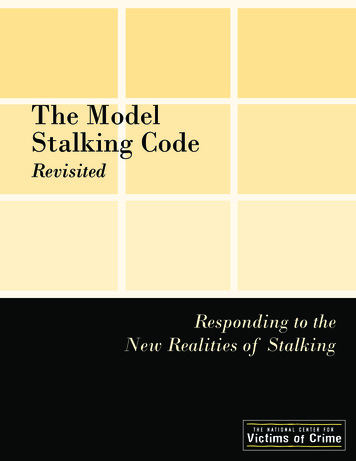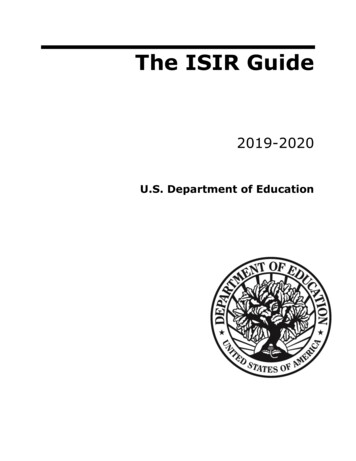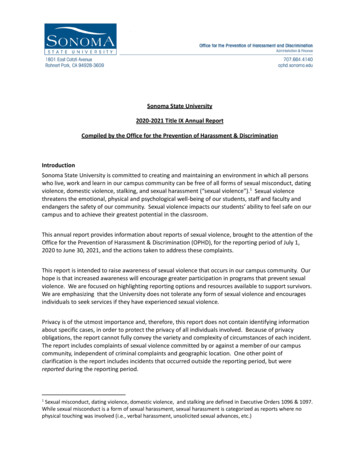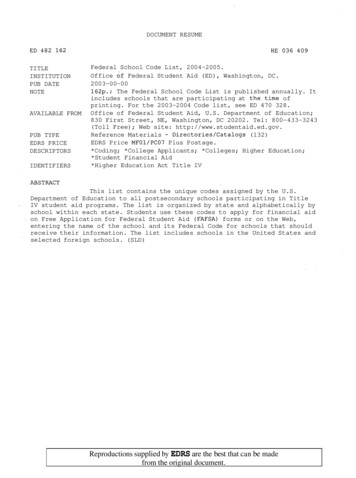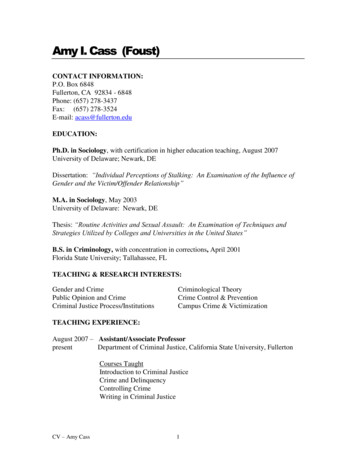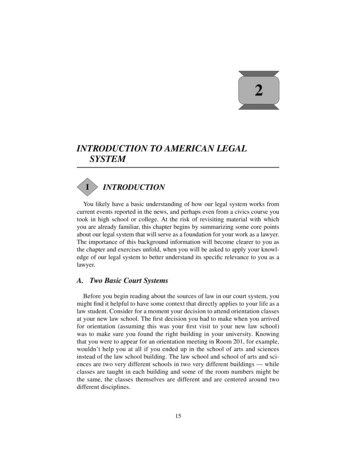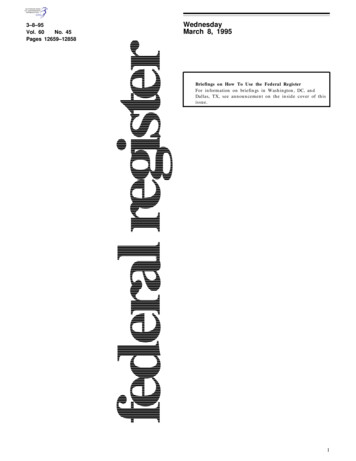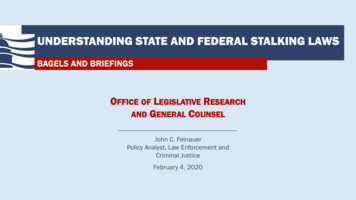
Transcription
UNDERSTANDING STATE AND FEDERAL STALKING LAWSBAGELS AND BRIEFINGSOFFICE OF LEGISLATIVE RESEARCHAND GENERAL COUNSELJohn C. FeinauerPolicy Analyst, Law Enforcement andCriminal JusticeFebruary 4, 2020
UNDERSTANDING STATE AND FEDERAL STALKINGLAWSOutlineHistoryState LegislationModel LegislationFederal LegislationUtah LawsSentencingKey ElementsThe Future
UNDERSTANDING STATE AND FEDERAL STALKING LAWSHistory“An old problem with a new name”New attention on a wide scale dueto changes in mass mediaStatus Quo tools (protective orders,etc.) were deemed insufficientRenewed interest in violent crimeand women’s issuesReformers sought a “preventative”tool
UNDERSTANDING STATE AND FEDERAL STALKING LAWSSeveral high-profilecases in California: Murder of model/actressRebecca ShaefferAssault of actress TheresaSaldanaMurders of four women inOrange County, Ca.Rebecca ShaefferTheresa Saldana
UNDERSTANDING STATE AND FEDERAL STALKING LAWSCalifornia 1990 Narrow approach.Required a “credible threat of death or great bodily injury”Set the standard for other states to follow.Amended in 1994 to broaden the statute after a high-profileincident couldn’t be prosecuted.Current CodeCal Pen Code § 646.9 . Stalking.(a) Any person who willfully, maliciously, and repeatedlyfollows or willfully and maliciously harasses another personand who makes a credible threat with the intent to placethat person in reasonable fear for his or her safety, or thesafety of his or her immediate family is guilty of the crimeof stalking
UNDERSTANDING STATE AND FEDERAL STALKING LAWS1990California passesfirst law in thecountry.
UNDERSTANDING STATE AND FEDERAL STALKING LAWS199229 states haveenacted laws.By early 1993, 36states have enactedlaws and 12 havepending legislation.
UNDERSTANDING STATE AND FEDERAL STALKING LAWS1993All states and theDistrict of Columbiahave stalking laws.
UNDERSTANDING STATE AND FEDERAL STALKING LAWSState VariationsNarrow approach: Limiting to the threat of physicalviolenceCaliforniaColoradoTennesseeBroad approach: Encompasses potentiallyprotected behaviorFloridaIdahoDelaware
UNDERSTANDING STATE AND FEDERAL STALKING LAWSModel LegislationAny person who purposefully engages in a course of conductdirected at a specific person and knows or should know that thecourse of conduct would cause a reasonable person to:(a) fear for his or her safety or the safety of a third person; or(b) suffer other emotional distress is guilty of stalking.
UNDERSTANDING STATE AND FEDERAL STALKING LAWSFederal LawInterstate and foreign travel18 U.S. Code § 2261A.Stalking(A) places that person in reasonable fear of the death of,or serious bodily injury to–(i) that person;(ii) an immediate family member (as defined in section115) of that person; or(iii) a spouse or intimate partner of that person; or(B) causes, attempts to cause, or would be reasonablyexpected to cause substantial emotional distress to aperson described in clause (i), (ii), or (iii) of subparagraph(A)Passed in 1996 as part of the Violence Against Women Act
UNDERSTANDING STATE AND FEDERAL STALKING LAWSUtah’s LawsCriminal Stalking Statute - 76-5-106.5.Civil Stalking Injunction- 77-3a-101.(2) A person is guilty of stalking who intentionally orknowingly engages in a course of conduct directedat a specific person and knows or should know thatthe course of conduct would cause a reasonableperson:(a) to fear for the person's own safety or the safety of athird person; or(b) to suffer other emotional distress.Same definition of “stalking” as criminal statute.(3) A person is guilty of stalking who intentionally orknowingly violates:(a) a stalking injunction issued pursuant to Title 77,Chapter 3a, Stalking Injunctions; or(b) a permanent criminal stalking injunction issuedpursuant to this section.“ (2) Any person who believes that he or she is thevictim of stalking may file a verified written petition fora civil stalking injunction against the alleged stalkerwith the district court in the district in which thepetitioner or respondent resides or in which any of theevents occurred. A minor with his or her parent orguardian may file a petition on his or her own behalf, ora parent, guardian, or custodian may file a petition onthe minor's behalf.”
UNDERSTANDING STATE AND FEDERAL STALKING LAWSSentencingModel LegislationUtah Statute Stalking is a felony. Four potential aggravatingfactors. Class A misdemeanor if firstoffense or stalking injunctionviolation. Third degree felony ifpreviously convicted or acohabitant. Second degree felony if usesa dangerous weapon or hasbeen previously convicted twoor more times.
UNDERSTANDING STATE AND FEDERAL STALKING LAWSKey ElementsCourse of ConductIntentFearTargetActionsOccurrences“Knows orshould know”“ReasonablePerson”Direct orindirecttargeting
UNDERSTANDING STATE AND FEDERAL STALKING LAWSCourse of Conduct What acts are included? Some states leave the actions more open (model, “includes but not limited to”) some statesprovide a list. How many occurrences? Most common: “a pattern of conduct composed of a series of 2 or more ” Some states (AR) outline a structure of time. What was the outcome? Emotional distress
UNDERSTANDING STATE AND FEDERAL STALKING LAWSModel Legislation“Course of conduct” means two or more acts, including, but notlimited to, acts in which the stalker directly, indirectly, or throughthird parties, by any action, method, device, or means, follows,monitors, observes, surveils, threatens, or communicates to orabout, a person, or interferes with a person’s property.”
UNDERSTANDING STATE AND FEDERAL STALKING LAWSUtah Statute"Course of conduct" means two or more acts directed at or toward a specific person, including:(i)acts in which the actor follows, monitors, observes, photographs, surveils, threatens, orcommunicates to or about a person, or interferes with a person's property:(A) directly, indirectly, or through any third party; and(B) by any action, method, device, or means; or(ii) when the actor engages in any of the following acts or causes someone else to engage in any ofthese acts:(A) approaches or confronts a person;(B)appears at the person's workplace or contacts the person's employer or coworkers;(C) appears at a person's residence or contacts a person's neighbors, or enters property owned, leased,or occupied by a person;(D) sends material by any means to the person or for the purpose of obtaining or disseminatinginformation about or communicating with the person to a member of the person's family or household,employer, coworker, friend, or associate of the person;(E) places an object on or delivers an object to property owned, leased, or occupied by a person, or tothe person's place of employment with the intent that the object be delivered to the person; or(F) uses a computer, the Internet, text messaging, or any other electronic means to commit an act thatis a part of the course of conduct.
UNDERSTANDING STATE AND FEDERAL STALKING LAWSIntent General Intent The stalker intends the actions in which he/she engages. The stalker does not necessarily intend the consequences. Specific Intent Intends the consequences of his/her actions.
UNDERSTANDING STATE AND FEDERAL STALKING LAWSModel LegislationAny person who purposefully engages in a course of conductdirected at a specific person and knows or should know that thecourse of conduct would cause a reasonable person to:(a) fear for his or her safety or the safety of a third person; or(b) suffer other emotional distress is guilty of stalking.Utah StatuteA person is guilty of stalking who intentionally or knowingly engagesin a course of conduct directed at a specific person and knows orshould know that the course of conduct would cause a reasonableperson
UNDERSTANDING STATE AND FEDERAL STALKING LAWSFear Standard of Fear Victim must prove the experience of actual fear. “Reasonable person” would experience fear. Level of Fear What type of fear did they experience? (terrorized, frightened, intimidated, or threatened) Emotional Distress(b) “Emotional distress” means significant mentalsuffering or distress that may, but does not necessarily,require medical or other professional treatment orcounseling.
UNDERSTANDING STATE AND FEDERAL STALKING LAWSFear“Fear is the common currency of the stalker. Conduct that createsfear in others is what stalking laws essentially seek to eliminate.” D. Beatty“Since stalking statutes criminalize what otherwise would belegitimate behavior, based upon the fact that the behaviorinduces fear; the level of fear in a stalking victim is a crucialelement.” Drafters of the Model Stalking Code
UNDERSTANDING STATE AND FEDERAL STALKING LAWSTarget Broad Association “fear for his or her safety or the safety of a third person” Narrow Association Ex: Arizona the victim, the victim’s family member, domestic animal or livestock; a person with whom the victim has or has previously had a romantic or sexual relationship; a person who regularly resides in the victim’s household or has resided in the victim’shousehold within the six months before the last conduct occurred.
UNDERSTANDING STATE AND FEDERAL STALKING LAWSCyberstalkingNew Challenges Presented by the InternetCyberstalkingUtah Stalking StatuteCyberbullyingElectronic Harassment“Uses a computer, the Internet, text messaging, or any otherelectronic means to commit an act that is a part of the course ofconduct.”
UNDERSTANDING STATE AND FEDERAL STALKING LAWSDiscussion
Policy Analyst, Law Enforcement and Criminal Justice February 4, 2020. Outline UNDERSTANDING STATE AND FEDERAL STALKING LAWS History State Legislation Model Legislation Federal Legislation Utah Laws . UNDERSTANDING STATE AND FEDERAL STALKING LAWS Criminal Stalking Statute - 76-5-106.5. Civil Stalking Injunction- 77-3a-101.
